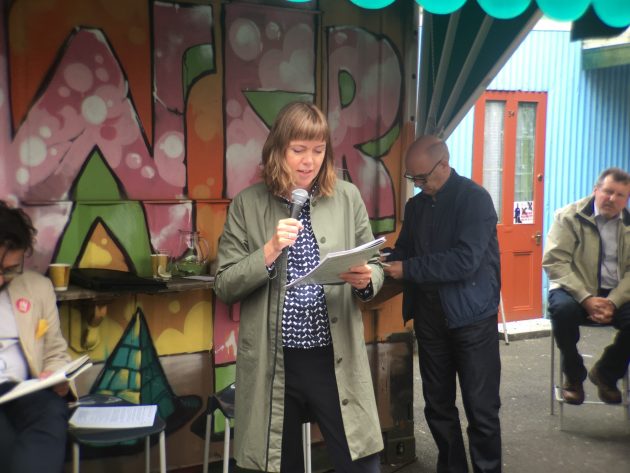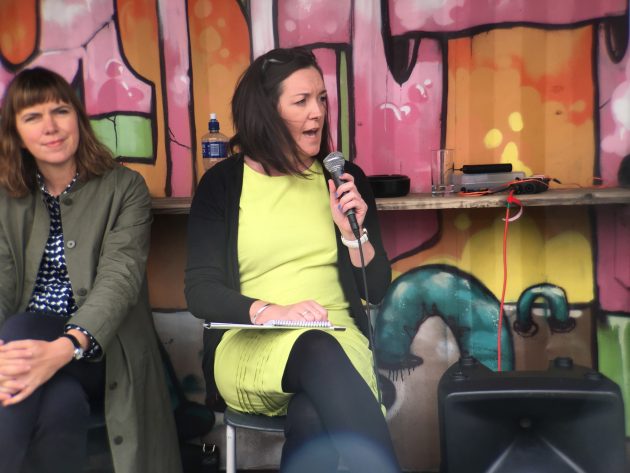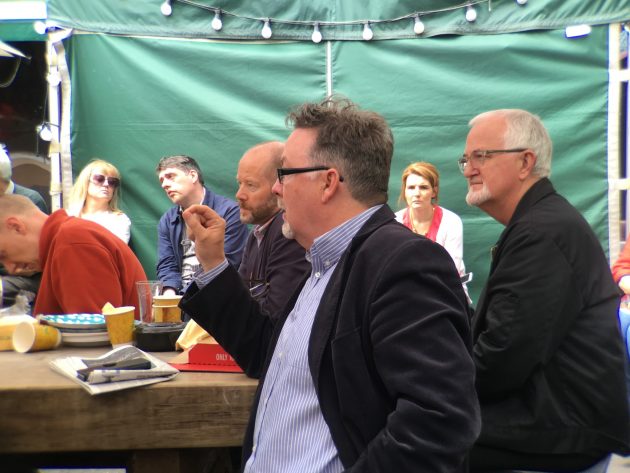 On day two of the Xchange Summer School, Daniel Jewesbury led a walking tour around buildings in Belfast, following the trail of sculpted heads on buildings with a connection to the Fitzpatrick Brothers. A story of political shenanigans, dodgy tendering, beautiful buildings … and a bank with a lot of steps up into it that proved fatal for one of its directors.
On day two of the Xchange Summer School, Daniel Jewesbury led a walking tour around buildings in Belfast, following the trail of sculpted heads on buildings with a connection to the Fitzpatrick Brothers. A story of political shenanigans, dodgy tendering, beautiful buildings … and a bank with a lot of steps up into it that proved fatal for one of its directors.
After two hours trekking from the City Hall to the Malmaison, the delegates reconvened in the beer garden of the Sunflower Pub. A panel discussed Belfast, the city of 7 quarters. [You can also review the first day of the summer school.]
David Gavaghan, Rita Harkin, Mark Hackett, Daniel Jewesbury, Orla McCann and Dermot O’Kane shared their insights into how Belfast got into the shape it is in, and how things might be improved. The Troubles affected the landscape (though insurance rebuilt most commercial buildings that were damaged) but the planning rot started doing damage long before the conflict started.
 David Gavaghan reckons a rapid injection of 30,000 extra people living into the city centre would transform it. Rita Harkin value “the extraordinary within the ordinary” over signature projects that favour shiny facades and concrete pours. Mark Hackett recognised that Belfast lost belief in itself during the 1950s. emphasised the need for quarters to be properly connected rather than left as isolated hubs or ghettos, a particular problem for Belfast whose main division is class rather than religion.
David Gavaghan reckons a rapid injection of 30,000 extra people living into the city centre would transform it. Rita Harkin value “the extraordinary within the ordinary” over signature projects that favour shiny facades and concrete pours. Mark Hackett recognised that Belfast lost belief in itself during the 1950s. emphasised the need for quarters to be properly connected rather than left as isolated hubs or ghettos, a particular problem for Belfast whose main division is class rather than religion.
“A city doesn’t need to be hung, drawn or quartered!”
 David Jewesbury was fearful that the rush to build new student accommodation was the new speculative property bubble. Orla McCann questioned the accessibility of buildings, and highlighted that physical access was not the only issue. Working for Disability Action she recognised that the sector can be perceived as always saying no. She pointed to the trend towards shared surfaces (footpaths running level with roads) and asked the delegates to imagine how confusing and dangerous that could be. She also noted that it run against the common road safety taught to children: stop at the kerb. Orla finished by saying that Belfast was “designing in the bland” only using a “limited palette of colours”. Dermot O’Kane was the last panellist to speak. He saw the local development plan as a way for us to leave our legacy for future generations.
David Jewesbury was fearful that the rush to build new student accommodation was the new speculative property bubble. Orla McCann questioned the accessibility of buildings, and highlighted that physical access was not the only issue. Working for Disability Action she recognised that the sector can be perceived as always saying no. She pointed to the trend towards shared surfaces (footpaths running level with roads) and asked the delegates to imagine how confusing and dangerous that could be. She also noted that it run against the common road safety taught to children: stop at the kerb. Orla finished by saying that Belfast was “designing in the bland” only using a “limited palette of colours”. Dermot O’Kane was the last panellist to speak. He saw the local development plan as a way for us to leave our legacy for future generations.
 Mick Fealty asked the panel to explain what the smallest change that could be made to policy that would make a difference? Answers included matching empty homes with housing need, ensuring planners and developers engaged with end users, introducing a height limit for new development (long term policies in Paris and Berlin), working with newcomers to the city, having an elected Mayor of Belfast and appoint a town planner.
Mick Fealty asked the panel to explain what the smallest change that could be made to policy that would make a difference? Answers included matching empty homes with housing need, ensuring planners and developers engaged with end users, introducing a height limit for new development (long term policies in Paris and Berlin), working with newcomers to the city, having an elected Mayor of Belfast and appoint a town planner.
Alan Meban. Tweets as @alaninbelfast. Blogs about cinema and theatre over at Alan in Belfast. A freelancer who writes about, reports from, live-tweets and live-streams civic, academic and political events and conferences. He delivers social media training/coaching; produces podcasts and radio programmes; is a FactCheckNI director; a member of Ofcom’s Advisory Committee for Northern Ireland; and a member of the Corrymeela Community.
Discover more from Slugger O'Toole
Subscribe to get the latest posts to your email.
